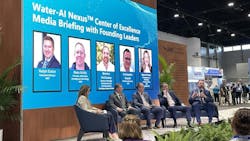Water sector enters AI era as adoption rates accelerate
The emergence of AI drew a lot of attention from attendees at WEFTEC 2025 in Chicago where experts stated that it is lowering barriers to digital adoption for water and wastewater utilities. During a Water-AI Nexus Center of Excellence presentation WEF President Ralph Exton, AWS Water Strategy and Technology Principal Beau Schitz, The Water Center at the University of Pennsylvania Director of Strategic Development and Communications Brenton McCloskey, Publisher and Owner of GWI Chritopher Gasson and WEF Managing Director for Marketing and Communications Alyson Moses offered new ways to boost efficiency, manage aging infrastructure and adapt to climate pressures.
“The barriers to entry and the costs of these large IT projects are going to fall,” said Gasson during the panel discussion, underscoring how the technology is making once-costly IT solutions more practical for utilities of all sizes.
The Water-AI Nexus aims to serve as a neutral platform that brings together utilities, researchers, policymakers and private-sector partners. “We were set up to be a neutral voice – to bring together academic research and policy perspectives into a thought leadership space where we can really explore issues like AI and water,” said McCloskey.
The speakers emphasized that AI adoption is advancing faster in water than past technology waves. “With AI coming into the fold the way it has in the last few years, it’s been one of the highest trajectory rates in the water sector than anything else,” Exton said.
Beyond efficiency gains, utilities are eyeing AI as a tool to stretch limited resources and make smarter capital investments. Leak detection, for example, could help reduce the more than 2 trillion gallons of water lost annually in the U.S. through leakage and other issues. “That’s more than enough to serve the entire data center industry multiple times over,” said AWS’ Schitz, who added that the company is working with utilities directly to help address high loss rates.
The experts also framed AI as central to navigating what they called the “water transition,” a parallel to the energy transition. “We’re moving from a narrow water cycle to one that’s much wider due to climate change,” Gasson said. “Our infrastructure was built for the old world, and AI will be at the center of adapting to the new one.”
Smaller utilities can benefit from AI as well but often lack the workforce or data to take full advantage of it. The Water Center is working across disciplines, including public policy, law and health, to help such systems access and apply data-driven tools.
The panel made clear that the Water-AI Nexus is intended as a long-term effort. Organizers said a dedicated microsite has already been created to host resources and share case studies as the initiative grows.
Related content
About the Author
Alex Cossin
Associate Editor
Alex Cossin is lead reporter, staff writer and content strategist for Waterworld Magazine, Wastewater Digest, Stormwater Solutions and Water Technology. Cossin graduated from Kent State University in 2018 with a Bachelor of Science in Journalism. Cossin can be reached at [email protected].


